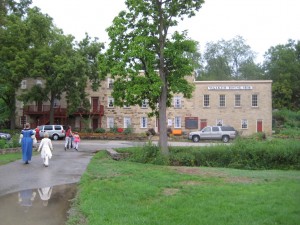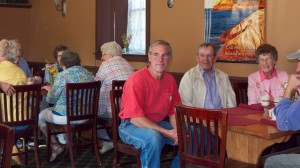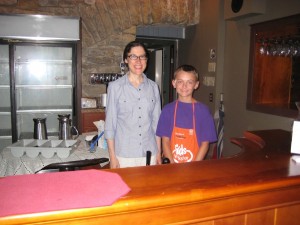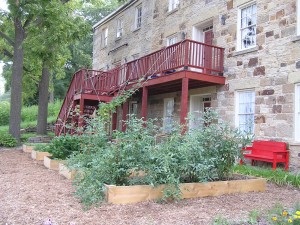All events sponsored by the World Institute for Extreme Beauty, LLC (the Institute) take place in its home, the Walker House in Mineral Point, Wisconsin. However, the Institute does not own the Walker House; it rents space in the House from Walker-Curtis, LLC to conduct its programs. This means that other organizations also rent space in the Walker House to hold events, meetings, reunions, and the like. The philosophy below guides the development of the Institute events only, and, as with all philosophies, not all aspects can be implemented in each event.
The Institute chose the Walker House as its home, because the House, consistent with its unique 175+-year-old history, offers an unparalleled, old-fashioned existential experience where life and its rhythms move in a relaxed manner, all on a human scale. (At the Walker House, guests unplug and recharge.) Whatever the stated goals of the various events, the Institute promotes five foundational behaviors that inform each event: human beings need at times to unplug and to rest, relax, and enjoy life by nourishing their bodies, living in community, creating in fellowship, consuming mindfully, and expressing gratitude. The first and fifth goals need little explanation since contemporary culture emphasizes the benefits of regular exercise, proper nutrition, and thankfulness. But living in community, creating in fellowship, and consuming mindfully may need a few words of explanation.
Living in community. The Institute attempts to organize most events around the rhythms of four daily times: eating time, learning time, playing time, and evening relaxing time. Eating time is more than the act of eating; it is a time for guests to join Dan and KathyVaillancourt, co-founders of the Institute, to prepare meals (which include organic food hand-picked from the House gardens), to savor the food in community and conversation, and then to linger together a bit after each meal to clear the table and wash the dishes. Ronald Reagan believed eating in community to be so important that he quipped, “All great change in America begins at the dinner table.” Learning time commences after the meal clean-up and includes activities like Dan leading a Walker House architectural and historical tour or a local artist explaining the beauty of the art in one of the three galleries. Sometimes, guests gather around the Walker House 55” HDTV to watch and discuss a short program or movie. Learning is one of life’s delicious spices, and “it never exhausts the mind,” according to Leonardo Da Vinci. Playing time usually precedes meal preparation. It can include a meditative stroll through the House gardens or a brisk walk, hike, or run on the 45-mile Cheese Country Trail that begins in front of the House; a bike trip on a quiet and scenic country road, a swim in the Olympic-size municipal pool, or a set or two of tennis at the Park courts. Seasons and activities change, but the fun of play remains the same. Play is so important that Ralph Waldo Emerson claims that “it is a happy talent to know how to play.” Evening relaxing time begins after the supper meal clean-up. Guests can gaze at the stars or listen to a gentle waterfall gurgle through rocks by the back patio; they can tell and listen to stories in front of a campfire outside or by one of the fireplaces in the pub; they can enjoy live music played on the dining room piano or electronic keyboard; they can look at beautiful art in one of the three galleries; they can munch on popcorn while watching the “Movie of the Night” on the 55” HDTV. Jane Austen brings relaxing time to a new level when she says, “To sit in the shade on a fine day, and look upon verdure is the most perfect refreshment.” The rhythms of the four daily times nudge guests toward life in community, one of the Institute’s foundational behaviors informing its events.
Creating in fellowship. Creativity transcends all boundaries, and so the Institute does not differentiate between fine art and low art, between display art and practical art, or even between artist and manual laborer. Indeed, every worker is an artist of some kind, and brings creativity, honor, and discipline to the job. Most Institute events include creative work, whether that work be painting or sculpting, plumbing or tuckpointing, gardening or dishwashing, walking or fishing, resting or daydreaming, or work on personal transformation. When guests create tangible products, they participate in evening open critiques of the products. The critiques supply a fellowship dimension to the creative process. But fellowship also plays a role in another way. If some of the products meet the Institute’s standard for extreme beauty, the Institute may authorize their purchase and then share them with the world in multiple ways—in one of the Walker House galleries, on the Institute website, or in the Institute stores. Fellowship helps create the products, and fellowship motivates their distribution. This form of fellowship provides an illustration of what Einstein meant when he said, “Only a life lived for others is the life worthwhile,” and it supplies another of the Institute’s foundational behaviors informing its events.
Consuming mindfully. Americans (5% of the world’s population) consume almost 30% of the world’s resources, and much of this consumption is occurring mindlessly in the home. The Institute attempts to build mindful consumption of the everyday things in its events by developing two strategies related to love. First, love for others provides the motivation for mindful consumption. “Love others,” the saying goes, “and you want to share what you have with them.” The Institute explores ways to cultivate this love for others so that a strong motivation can be developed to explore mindful consumption. Second, the Institute takes to heart the wise counsel of Mother Teresa: “You cannot do great things, only little things with great love.” Great love focused on little activities forces the mind to pay attention to what it is doing, and this concentration automatically limits and simplifies consumption. A common activity in the home like turning off a light switch when leaving a room illustrates how the two strategies related to love can work together. Bright light bulbs in an empty room consume an energy resource, and current energy resources are not inexhaustible. When people compete for this resource, the law of limited supply and abundant demand causes the cost of the resource to rise, thereby making it difficult if not prohibitive for people with limited income to purchase the resource. Some people cannot afford electricity while others waste it. What motivation would the more affluent person have to consume mindfully? Only love can make it happen—a love so profound for the other person that the affluent person will remember each time to turn the light off. The Institute’s events incorporate activities related to mindful consumption in an attempt, as Mother Teresa says, “To live simply so others may simply live.” Mindful consumption supplies yet another of the Institute’s foundational behaviors.
In sum, lodging at the Walker House provides a good night’s rest but also an existential learning experience related to physical well-being, community, fellowship, mindfulness, and gratitude—five foundational behaviors that support the growth of genius and the birth of extreme beauty.





